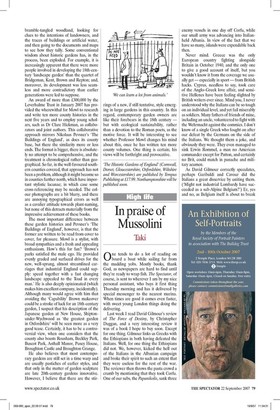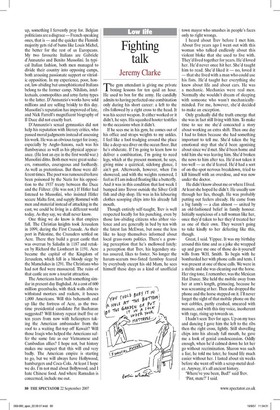In praise of Mussolini
Taki ne tends to do a lot of reading on board a boat while sailing far from the madding yobs. Mostly books, thank God, as newspapers are hard to find until they're ready to wrap fish. The Spectator, of course, is sent to wherever I am by my nice personal assistant, who buys it first thing Thursday morning and has it delivered by special messenger to the nearest marina. When times are good it comes even faster, with sweet young London things doing the delivering.
Last week I read David Gilmour's review of The Force of Destiny, by Christopher Duggan, and a very interesting review it was of a book I hope to buy soon. Except for one thing. Gilmour links us Greeks with the Ethiopians in both having defeated the Italians. Well, for one thing the Ethiopians did not. We, however, kicked the hell out of the Italians in the Albanian campaign and broke their spirit to such an extent that they were useless for the rest of the war. The reviewer then throws the pasta crowd a crumb by mentioning that they took Corfu. One of our subs, the Papanikolis, sank three enemy vessels in one day off Corfu, while our small army was advancing into Italianheld Albania. In view of the fact that we have so many, islands were expendable back then.
Never mind. Greece was the only European country fighting alongside Britain in October 1940, and the only one to give a good account of itself, but you wouldn't know it from the coverage we usually get — especially in sport — from British hacks. Cyprus, needless to say, took care of the Anglo-Greek love affair, and sensitive Hellenes have been feeling slighted by British writers ever since. Mind you, I never understood why the Italians can be so tough on an individual level, and yet fail miserably as soldiers. Many fathers of friends of mine, including an uncle, volunteered to fight with the Wehrmacht against the commies I don't know of a single Greek who fought on after our defeat by the Germans on the side of the Italians. We thought them a joke, and obviously they were. They even managed to sink Erwin Rommel, a man no American commander except for Patton, and certainly no Brit, could match in panache and military acumen.
As David Gilmour correctly speculates, perhaps Garibaldi and Cavour did the Italians a great disservice by uniting them. (Might not industrial Lombardy have succeeded as a sub-Alpine Belgium?') Er, yes and no, as Belgium itself is about to break up, something I fervently pray for. Belgian politicians are a disgrace —French-speaking ones, that is — and the quicker the Flemish majority gets rid of bums like Louis Michel, the better for the rest of us Europeans. My two favourite Italians are Gabriele d'Annunzio and Benito Mussolini. In typical Italian fashion, both men managed to divide their country into opposing camps, both arousing passionate support or vitriolic opposition. In my experience, poor, honest, law-abiding but unsophisticated Italians belong to the former camp. Nihilists, intellectuals, cosmopolites and artsy-fartsy types to the latter. D'Annunzio's works have sold millions and are selling briskly to this day. Mussolini's reputation has improved of late, and Nick Farrell's magnificent biography of Ii Duce did not exactly hurt.
D'Annunzio's sexual gymnastics did not help his reputation with literary critics, who passed moral judgments instead of assessing his work. He was an obvious target for irony, especially by Anglo–Saxons, such was his flamboyance as well as his physical appearance. (He lost an eye in the first world war.) Mussolini ditto. Both men were great seducers, romantics, courageous and foolhardy. As well as pretentious. But those were different times. The poet was rumoured to have been poisoned by the Nazis for his opposition to the 1937 treaty between the Duce and the Rihrer. (He was not.) If Hitler had listened to Mussolini, who insisted Hitler secure Malta first, and supply Rommel with men and material instead of attacking in the east, we could be living in a different world today. As they say, we shall never know.
One thing we do know is that empires fall. The Christian knights took Jerusalem in 1099, during the First Crusade. As their port in Palestine, the Crusaders settled on Acre. There they build a great castle that was overrun by Saladin in 1187 and retaken by Richard the Lionheart in 1191. Acre became the capital of the Kingdom of Jerusalem, which fell in a bloody siege by the Mamelukes in 1291. The Christians who had not fled were massacred. The ruins of that castle are now a tourist attraction.
The Americans have built something similar in present-day Baghdad. At a cost of 600 million greenbacks, with thick walls able to withstand mortars and rockets, it houses 1,000 Americans. Will this behemoth end up like the fortress of Acre, as the twotime presidential candidate Pat Buchanan suggested? Will history repeat itself five or ten years from now with helicopters taking the American ambassador from the roof to a waiting flat-top off Kuwait? Will those Iraqis who helped the Americans suffer the same fate as our Vietnamese and Cambodian allies? I hope not, but history makes me suspect that this will end very badly. The American empire is starting to go, but we will always have Hollywood, hamburgers and Coca-Cola. At least I hope we do. I'm not mad about Bollywood, and I hate Chinese food. And where Ramadan is concerned, include me out.


































































 Previous page
Previous page